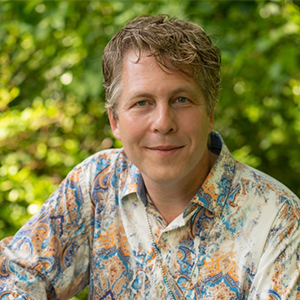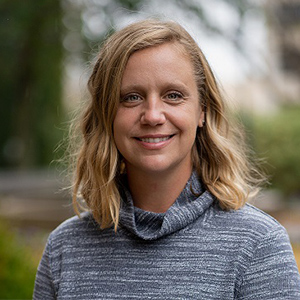Lara Lomicka Anderson’s six years as faculty principal of Preston Residential College held some of the most rewarding experiences of her academic career. As a faculty principal in one of the university’s seven faculty-led living-learning communities, she was presented with a unique opportunity to shape the early college years of students living at Preston. In alignment with Preston’s theme — leadership — Lomicka Anderson offered academic and social supports including mentoring, community events and experiential learning.
Now, having completed her term limit as a faculty principal, Lomicka Anderson is serving in the interim role of vice provost for undergraduate affairs. In this role, she will work alongside Kirsten Kennedy, associate vice president for the residential experience and Provost Donna Arnett to help other faculty principals provide their own communities with enriching educational experiences.
The opportunities provided to students as part of the living-learning community experience are invaluable, allowing them to connect and build relationships within their fields while harnessing the resources and professional networks of their faculty principals. The University of South Carolina employs a particularly successful faculty-led model, ranking No. 6 nationally among public universities for living and learning communities.
As new students settle into the IDEA community and Galen Health Fellows this academic year, they will meet two of the university’s incoming faculty principals, David Cutler and Alicia Flach, who are eager to make their mark on their respective communities.
Building an entrepreneurial culture
Innovation, Design, Entrepreneurship and Action Community

As an aspiring musician, David Cutler made all the right choices: attending the best schools, honing his skills and studying under top instructors. But when it came time to join the workforce, his mentor's response stunned him: He was completely on his own.
After overcoming the initial shock, Cutler realized that his experience was not unique. His peers had also received outstanding musical educations but had learned nothing about the entrepreneurial aspects of a career in the industry. That, Cutler realized, was a problem. He has been instrumental in starting conversation about solutions.
The first step is redefining who can be an entrepreneur, which is one of his goals as the incoming faculty principal for the newly rebranded IDEA community.
“With entrepreneurship, a lot of people think business,” he says. “But we want to have health care students, we want to have journalism students, engineering students, people from lots of disciplines to build a diverse mosaic of people. We are a community of big thinkers who get stuff done.”
Cutler, a distinguished professor of entrepreneurship and innovation in the School of Music, also believes in laying solid foundations for a strong beginning. Like the opening of a concert, the earliest moments of a school year set the expectation for everything that will follow.
“These living-learning communities are populated primarily by first-year students, and when someone’s younger, you can play a big role in helping them find their own voices," Cutler says. "The earlier you can reach them, the more positive impact you can make.”
Building on his priorities of inclusive entrepreneurship and engaging early experiences, Cutler hopes to foster a sense of camaraderie among community members, giving them confidence to flourish as creative thinkers and problem solvers. Through experiential learning opportunities, teamwork and faculty-student relationships, Cutler hopes to set students up for a future of entrepreneurial and innovative thinking.
Helping students navigate the health care landscape
Galen Health Fellows Living and Learning Community

Alicia Flach’s path to the medical field was a bit unconventional. A first-generation college student, she wasn’t sure what to do with her science major until a fortuitous volunteer opportunity arose at a local hospital in her junior year of college. Flach was randomly assigned to the rehabilitation unit, where she realized she wanted to pursue a career in physical therapy.
Catching up on observation hours and necessary classes wasn’t easy, but today, Flach is a physical therapist who specializes in degenerative neurological conditions and serves as a clinical associate professor in the Arnold School of Public Health. Though her journey has been satisfying, she knows that many students are less willing to leave anything up to chance. “I’m hoping to take some of the guesswork out of it for undergrads at this very critical time,” she explains.
Flach is eager to hit the ground running with the incoming class of Galen Health Fellows, a vibrant and diverse community of over 300 freshmen interested in health care. Her past decade of instruction has focused on graduate students, but she’s excited for a new opportunity. “Every career change I’ve made, it’s been to have more touchpoints with students,” she says. “This felt like a natural progression of being able to mentor even more students in becoming health care providers.”
In her new role, she brings a combination of clinical and education experience to the table, which will allow her to expose her students to a variety of professions and opportunities. Whether Galen students want to study abroad, partake in peer mentoring with older Galen Fellows or volunteer to provide trauma-informed health care at the Carolina Survivor Clinic, Flach will be there to provide them with support and guidance as they work toward their future professions.
Cutler and Flach join five other faculty-led community principals in ushering in a new class of students ready to thrive in their areas of interest. Besides the IDEA Community and Galen Health Fellows, the university is home to another 11 communities. The other communities led by faculty principals are Capstone Scholars, Green Quad, International House at Maxcy College, Preston Residential College and Rhodos Fellows, each of which is making its own mark on students with passions ranging from language learning to marine biology.
“There’s a lot of research that backs up having faculty involved and engaged with students in living-learning communities or in residential colleges,” says Lomicka Anderson. “It helps with retention. It helps with academic success. Students who are living in these communities can go to faculty for both support and for access to resources that faculty can help with.”